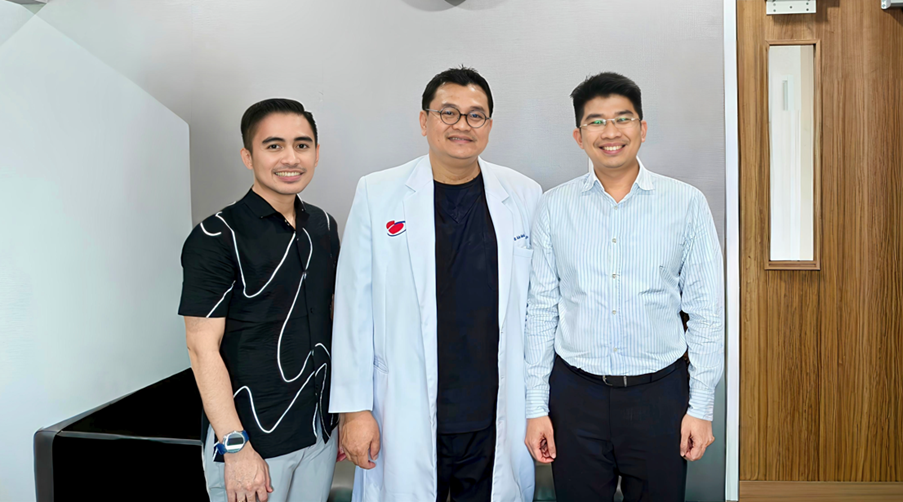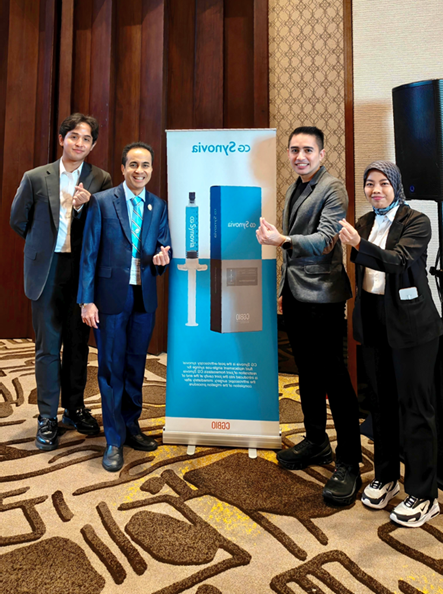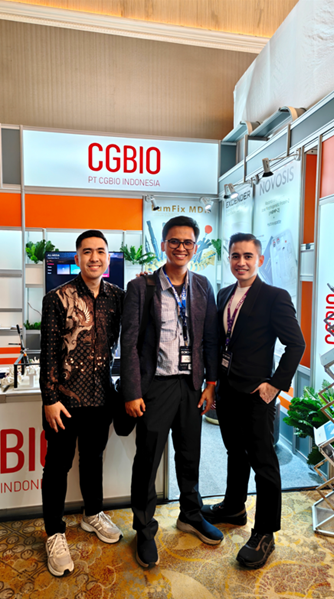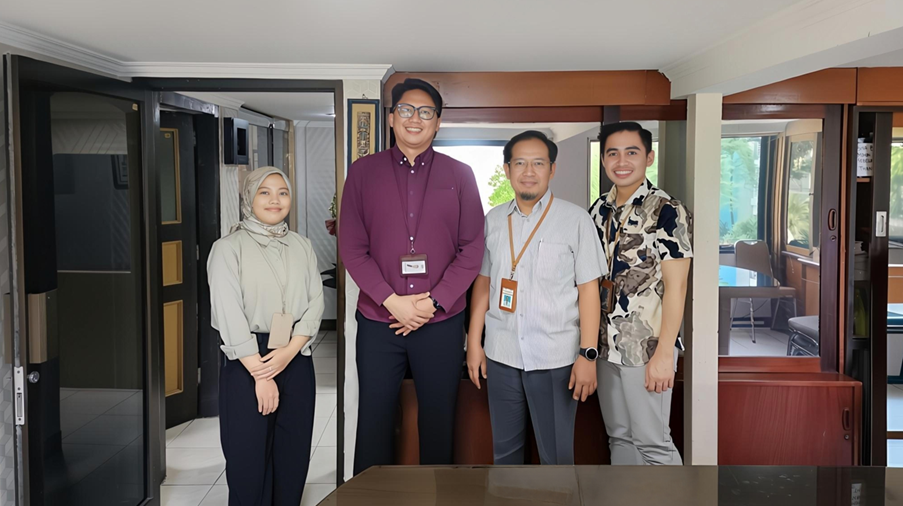Haritsah, Medical Affair at Daewoong Pharmaceutical Indonesia, truly embodies a “self-motivated professional who grows through his own initiatives.” After over ten years as an emergency medicine practitioner saving lives, he is now shaping evidence-based medicine through clinical research. His journey clearly reflects Daewoong’s core values of autonomy and growth.
From Clinical Practice to Research – Redefining the Direction of Growth
From the emergency room to trauma centers, he had always pursued the essence of medicine. Then, during the COVID-19 pandemic, one fundamental question stayed with him: “Why do patients respond differently to the same treatment?”
This question led him to the fields of functional and precision medicine. He completed a full course programs at the Institute for Functional Medicine and certification in DNAlife, where he systematically explored the possibilities of personalized medicine. But this process also made him confront a new reality. “To apply new treatments in actual clinical practice, you need solid evidence. And generating that evidence can only be done through research.”
This realization shifted his entire career path—from treating individual patients to designing frameworks and creating evidence that could improve overall standards of care.
Leaving the hospital was not an easy decision. But his desire to contribute at the upstream stage of healthcare grew stronger. “I wanted to design and conduct research that addresses Indonesia’s unmet medical needs. Medical Affairs is not just about reading research papers—it is about designing and executing impactful clinical studies.”

For him, the greatest meaning of this transition lies in contributing to medicine beyond individual patient care. “Helping one patient is important, but creating evidence that improves outcomes for many patients and society as a whole is a far greater motivation.”
Goals Born from Autonomy, Achievements Built on Responsibility
In June 2024, Haritsah joined Daewoong Pharmaceutical Indonesia. He had initially expected a sales-oriented organization but instead encountered a research-driven culture. Daewoong values performance and growth mindset over age, nationality, or background, providing opportunities for individuals to prove their capabilities through their own results.


Within this environment, Haritsah embodied both autonomy and accountability. He built a key opinion leader (KOL) network across Indonesia, developed feasibility reports, and independently prepared randomized controlled trial (RCT) proposals that covered budgets, protocols, and scientific rationale.
He successfully led studies such as Synovia and CREZET, as well as the first environmental hypertension report in Indonesia. He continues to widen his expertise through academic presentations and mentoring programs.
“My biggest drive was not instructions from others, but a personal sense of purpose and responsibility. An autonomous environment doesn’t just grant freedom—it is a promise to create results through one’s own initiative.”
Structuring Complex Medical Challenges
The quick decision-making and structured thinking he developed in emergency medicine now serve as his strengths as a Medical Affair. To him, clinical research is not a complex maze, but a process with a clear and logical structure.
“Clinical research involves many variables, but the essence is simple: It comes down to asking the right question and designing a system to validate it with data.”
He currently oversees multiple therapeutic areas, including orthopedics, cardiovascular disease, and botulinum toxin (NABOTA). By collaborating closely with experts from various disciplines, he builds practical and relevant research models that can be applied in the field.
“Good data is never created alone. Collaboration among colleagues, investigators, and regulatory agencies determines the quality of research.”

He also highlighted the connection between Indonesia’s clinical landscape and Daewoong’s strategic direction. “Indonesia’s clinical research infrastructure is still developing, and local data collection is key to establishing medical standards. Daewoong’s Global-Local Integrated R&D Strategy aligns perfectly with this approach, expanding local data into a global research network.”
Growing Together through the Win-Win-Win Culture
Haritsah has seen Daewoong’s Win-Win-Win culture in action. “During the CREZET observational study, the clinical operations team, marketing, and external researchers worked as one team. Boundaries between departments disappeared, and diverse perspectives came together to complete a patient-centered study.”
This experience proved that a “structure where everyone wins” is more than a slogan—it leads to real outcomes. “Collaboration enabled faster decision-making and problem-solving, and as a result, both efficiency and research quality increased. When everyone shares one goal, success naturally follows.”
He also underscored the importance of transparent communication in cross-functional collaboration. “Clinical research lies at the intersection of science, regulation, and business. That’s why transparent communication is essential.”

He elaborated on how he fosters collaboration with different stakeholders: “We hold regular meetings with headquarters to align R&D strategies, communicate closely with regulators (BPOM) from the earliest stages to minimize delays, and work actively with academia to design field-relevant studies and co-author publications. Listening and mutual respect are the foundation of all successful partnerships.”
A Structured Mechanism for Growth
Haritsah recalls his greatest moment of growth at Daewoong as the first time he independently managed the entire therapeutic portfolio. “Before that, I mostly followed plans made by senior colleagues, but now I had to lead every step—from study design and KOL collaboration to business planning and risk management. Through this experience, I learned the importance of precision, strategic thinking, and team trust. Thanks to Daewoong’s culture of autonomy and collaboration, I grew rapidly as both a researcher and a leader.”

He believes this experience deeply aligns with Daewoong’s systematic development programs. “Through the Career Development Program (CDP), I was able to clearly define my long-term path, and regular one-on-one feedback sessions helped me strengthen my leadership and project management skills.”
He is currently completing the Medical Affairs Professional Society (MAPS) course to build capabilities aligned with global standards. “My goal is to connect Indonesia’s data with global research and contribute to improving the quality of local healthcare.”
Breaking Barriers – Growth Beyond Boundaries
When asked about his future goals, he answered thoughtfully, “I want to lead multi-center research in precision medicine based on genetic data. I also hope to help younger medical advisors embrace challenges and grow with confidence.”
His vision extends beyond Indonesia to the global stage. “I plan to advance decentralized clinical trials (DCTs) using digital technology, so that patients in regions with limited medical access can also participate in research. By integrating pharmacogenomics and real-world evidence (RWE), I aim to strengthen tailored medicine in Indonesia and work with academic associations across Asia to expand the foundation of evidence-based medicine. I hope these efforts contribute meaningfully to global drug development.”

Finally, he summed up Daewoong in one phrase: “Breaking Barriers. Daewoong breaks boundaries of nationality, tenure, and experience, providing growth opportunities for every individual.”
Haritsah’s story demonstrates how autonomy and growth can drive both personal and organizational advancement. He continues to set his own goals and challenge limitations, putting into action Daewoong’s belief in breaking boundaries and growing beyond them.